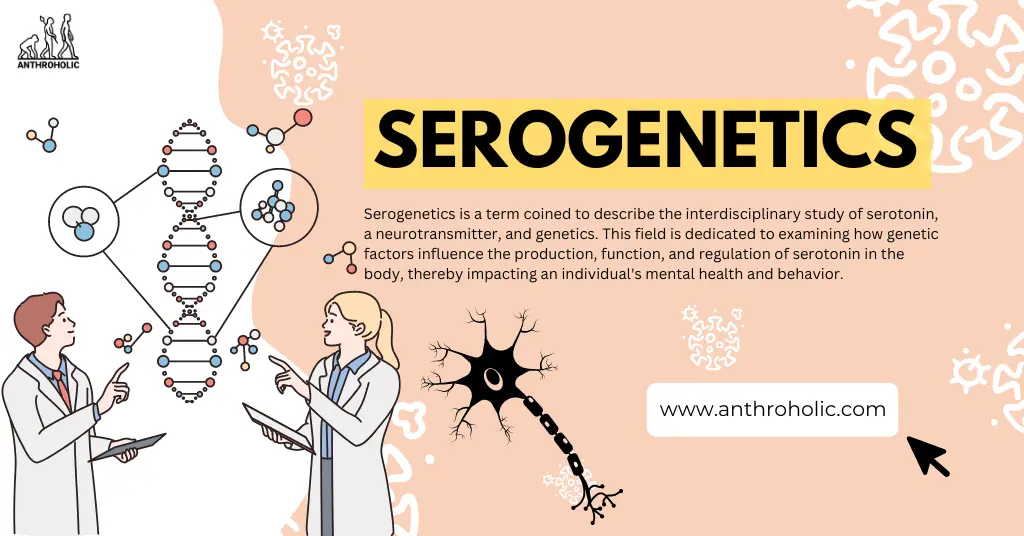AI Answer Evaluation Platform Live Now. Try Free Answer Evaluation Now
Serogenetics
The burgeoning field of genetics holds tremendous potential for the development of innovative and personalized treatments for a wide range of health conditions. Among the multitude of disciplines within genetics, serogenetics has emerged as a rapidly growing area of research that offers promising insights into our understanding of mental health disorders.

Serogenetics is a term coined to describe the interdisciplinary study of serotonin, a neurotransmitter, and genetics. This field is dedicated to examining how genetic factors influence the production, function, and regulation of serotonin in the body, thereby impacting an individual’s mental health and behavior.
The significance of serogenetics in today’s scientific landscape is vast. Our understanding of how genes influence serotonin function can lead to enhanced diagnostic tools, more effective treatment approaches, and better preventive strategies for mental health disorders. With mental illnesses contributing to a significant portion of the global burden of disease, serogenetics is poised to revolutionize our approach towards mental health care.
Understanding Serogenetics
Genetics is the study of genes and their influence on the traits and behavior of organisms. On the other hand, serotonin is a chemical compound that functions as a neurotransmitter in the brain, playing a crucial role in mood regulation, sleep patterns, appetite, and other behavioral processes.
As a neurotransmitter, serotonin helps transmit signals between nerve cells in the brain. It plays a crucial role in regulating mood, social behavior, appetite, sleep, memory, and learning. Imbalances in serotonin levels are often associated with mental health disorders such as depression and anxiety [1].
Our genes influence the production, transportation, and regulation of serotonin. Certain genetic variations can alter these processes, affecting the overall serotonin function in the body. This can, in turn, influence an individual’s susceptibility to mental health disorders and their response to treatment [2].
Serogenetics allows us to understand the complex interplay between our genes and serotonin. By studying genetic variations that affect serotonin function, we can gain insights into the biological underpinnings of various mental health disorders and develop more targeted treatment strategies.
Serogenetics Research
A. Evolution of serogenetics research
Serogenetics research has evolved over the years, with early studies focusing on the role of serotonin receptors and transporters. As our understanding of genetics grew, research started to investigate the impact of genetic variations on serotonin function, leading to breakthrough discoveries in the field.
| Year | Key Discovery | Study |
|---|---|---|
| 1960s | Discovery of serotonin’s role as a neurotransmitter. | Julius Axelrod’s groundbreaking research (Nobel Prize, 1970). |
| 1980s | Identification of serotonin receptors and transporters. | Various studies identified key components of the serotonin system. |
| 1990s | Recognition of genetic influence on serotonin. | Researchers started studying the link between genetics and serotonin. |
B. Key studies and discoveries
- Early studies on serotonin receptors and transporters: Early serogenetics research primarily revolved around understanding the role of serotonin receptors and transporters, integral parts of the serotonin system. Studies identified key genetic variations associated with these components, revealing their potential influence on serotonin function and mental health [3].
- Genetic variations and their impact on serotonin function: Further research discovered that certain genetic variations could alter the function of serotonin in the body. For instance, a variant of the serotonin transporter gene SLC6A4 was found to be associated with an increased risk of depression in individuals exposed to stressful life events [4].
- The role of serogenetics in mental health disorders: A growing body of research has demonstrated the significance of serogenetics in mental health. Certain genetic variations affecting serotonin function have been linked to mental health disorders such as depression, anxiety, schizophrenia, and bipolar disorder [5].
- Serogenetics and personalized medicine: Serogenetics has also contributed significantly to the field of personalized medicine. Genetic testing can predict an individual’s response to certain drugs, enabling healthcare providers to tailor treatment strategies accordingly [6].
Serogenetics and Mental Health
A. Serotonin and mental health disorders
Serotonin imbalances are commonly associated with mental health disorders. Low levels of serotonin are linked to depression, while fluctuations in serotonin can contribute to conditions such as bipolar disorder and schizophrenia [7].
B. Genetic variations and susceptibility to mental illnesses
Certain genetic variations can influence an individual’s susceptibility to mental health disorders. For example, a particular variant of the SLC6A4 gene increases the risk of depression following stressful life events [8].
C. Serogenetics and treatment approaches
- Pharmacogenetics and personalized medication: Pharmacogenetics, the study of how genes affect a person’s response to drugs, has important implications for treatment strategies in mental health. By considering an individual’s genetic makeup, doctors can prescribe medications that are more likely to be effective and have fewer side effects [6].
- Serogenetic biomarkers and diagnostic tools: The identification of serogenetic biomarkers has the potential to enhance diagnostic precision and enable early intervention in mental health disorders. Current research is focused on developing these biomarkers to guide treatment decisions and monitor response to therapy [8].
The Future of Serogenetics
A. Advancements in serogenetics research
Future advancements in serogenetics research are expected to further illuminate the genetic mechanisms underlying serotonin function and its influence on mental health. Emerging technologies like genome editing and next-generation sequencing hold promise for new discoveries in the field.
B. Potential applications and implications
- Precision medicine and tailored treatments: The future of serogenetics lies in personalized medicine, where treatment is tailored to an individual’s unique genetic makeup. This could lead to more effective therapies, improved patient outcomes, and reduced healthcare costs [9].
- Serogenetics and preventive medicine: Serogenetics may also pave the way for preventive medicine, enabling the identification of at-risk individuals and the implementation of early intervention strategies. Genetic testing could help predict the risk of mental health disorders, providing opportunities for proactive management [10].
- Ethical considerations and challenges: As with any advancements in genetics, serogenetics presents its own ethical challenges. Questions regarding privacy, informed consent, genetic discrimination, and the potential misuse of genetic information must be addressed to ensure the responsible application of serogenetics [11].
Conclusion
Serogenetics offers a promising approach to understanding and managing mental health disorders. By elucidating the genetic factors influencing serotonin function, it provides valuable insights into the biological mechanisms underlying these conditions, leading to more precise diagnostics and personalized treatments. Given the critical role of serotonin in various physiological processes and behaviors, serogenetics is instrumental in our understanding of human health. It holds significant potential for advancing our knowledge about mental health disorders and revolutionizing our approach towards mental health care.
The field of serogenetics, while still in its relative infancy, holds significant promise for the future. As research progresses, and our understanding deepens, the potential applications of serogenetics are vast and transformative, paving the way for a new era in personalized medicine and mental health care.
References
[1] Berger, M., Gray, J. A., & Roth, B. L. (2009). The Expanded Biology of Serotonin. Annual Review of Medicine, 60, 355-366. https://doi.org/10.1146/annurev.med.60.042307.110802
[2] Murphy, D. L., Lesch, K. P. (2008). Targeting the murine serotonin transporter: insights into human neurobiology. Nature Reviews Neuroscience, 9(2), 85-96.
[3] Lesch, K. P., Bengel, D., Heils, A., Sabol, S. Z., Greenberg, B. D., Petri, S., … & Murphy, D. L. (1996). Association of anxiety-related traits with a polymorphism in the serotonin transporter gene regulatory region. Science, 274(5292), 1527-1531. https://www.science.org/doi/10.1126/science.274.5292.1527
[4] Caspi, A., Sugden, K., Moffitt, T. E., Taylor, A., Craig, I. W., Harrington, H., … & Poulton, R. (2003). Influence of life stress on depression: moderation by a polymorphism in the 5-HTT gene. Science, 301(5631), 386-389.
[5] Serretti, A., & Mandelli, L. (2008). The genetics of bipolar disorder: genome ‘hot regions,’ genes, new potential candidates and future directions. Molecular psychiatry, 13(8), 742-771.
[6] Mrazek, D. A. (2010). Psychiatric pharmacogenomic testing in clinical practice. Dialogues in clinical neuroscience, 12(1), 69.
[7] Mann, J. J. (1999). Role of the serotonergic system in the pathogenesis of major depression and suicidal behavior. Neuropsychopharmacology, 21, 99S-105S.
[8] Le-Niculescu, H., Levey, D. F., Ayalew, M., Palmer, L., Gavrin, L. M., Jain, N., … & Belanger, F. (2013). Discovery and validation of blood biomarkers for suicidality. Molecular psychiatry, 18(12), 1249-1264.
[9] Collins, F. S., & Varmus, H. (2015). A new initiative on precision medicine. New England Journal of Medicine, 372(9), 793-795.
[10] Gottesman, I. I., & Shields, J. (2016). A polygenic theory of schizophrenia. Proceedings of the National Academy of Sciences, 58(1), 199-205.
[11] Knoppers, B. M. (2014). International ethics harmonization and the global alliance for genomics and health. Genome Medicine, 6(2), 13.



